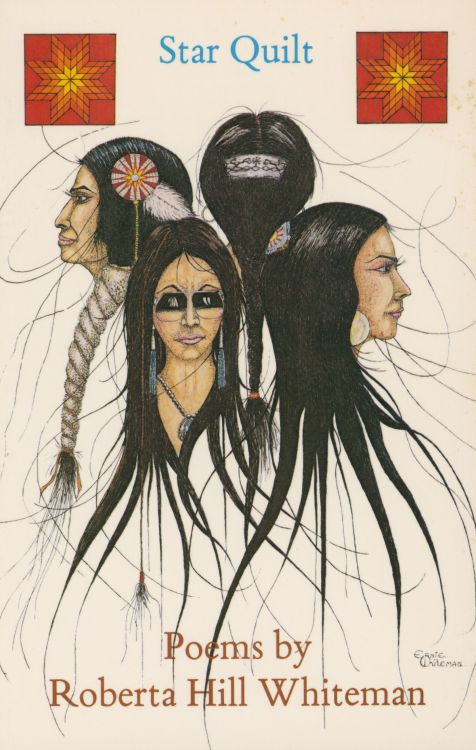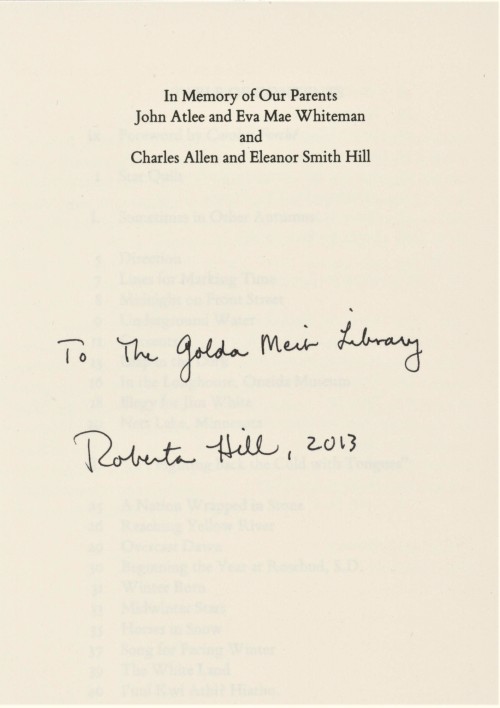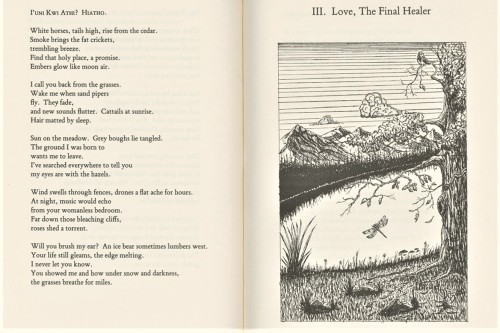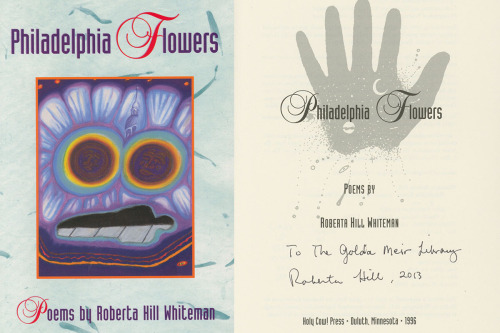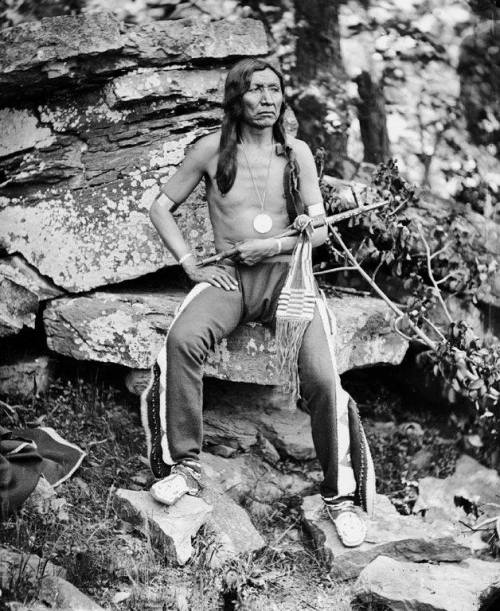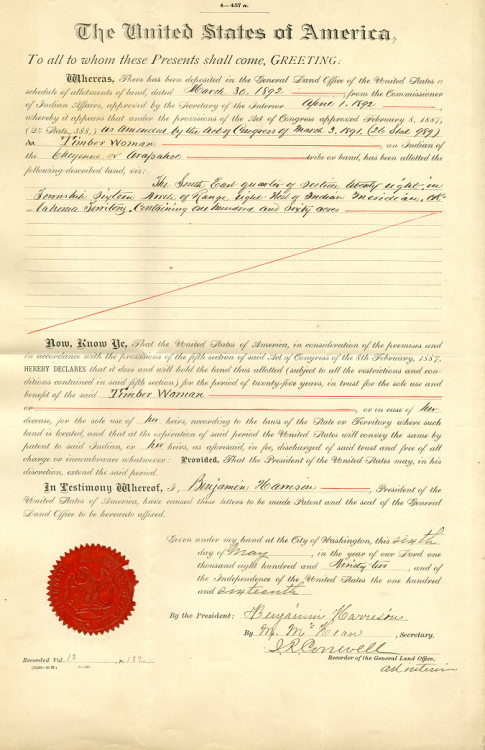#arapaho
Native American/First Nations Woman Writer of the Week
ROBERTA HILL
This week, we introduce you all to Roberta Jean Hill, formerly Roberta Hill Whiteman, a poet and educator native to Wisconsin! Born in 1947 near Green Bay, Roberta Hill grew up among the Oneida Indigenous peoples of Wisconsin, a rich heritage that enlightens her work as a poet and has driven her scholastic career. In her third poetry collection, Cicadas: New & Selected Poems, published by the Holy Cow! Press in 2013, Hill writes:
To the people, beings and places I love, named or unnamed, met and imagined. May they continue to inspire us to live and keep loving earth and her beings for all eternity.
UW-Milwaukee Special Collections preserves four signed presentation copies of Hill’s poetry books, all published by Jim Pearlman, founder and editor of Holy Cow! Press in Duluth, Minnesota, which is dedicated to publishing writers who live in the American Midwest and focuses on publishing Native American authors and thematic anthologies.
UWM Special Collections holds two copies of Hill’s first collection of poetry,Star Quilt, originally published in 1984 with foreword by poet, editor, professor, translator, and human rights advocate,Carolyn Forché. One is a first printing from 1984, signed in 2013 to our library, while the other is a second printing, illustrated and republished by the Holy Cow! Press in 1985, which is signed to Milwaukee poet and educator DeWitt Clinton.
The illustrations for both printings of Star Quilt were done by Hill’s husband, artist, director of First Nations Film and Video Festival, Inc, and member of theNorthernArapaho tribe,Ernest Whiteman. The cover art for the book is a portrait of a woman facing four ways, hinting at Roberta’s use of the four cardinal directions throughout the book that portray the separation and displacement that the Oneida peoples have experienced in a long history of forced migration by the U.S. government. Throughout the collection, Hill internalizes this feeling of loss and separation, utilizing an extended metaphor of dust in the winds returning to the Earth, from where the peoples are said to have come. The poem above, “I’uni Kwi Athi? Hiatho,” uses Hill’s father’s name, the meaning of which Hill says he never revealed.
In the glossary for Star Quilt, Hill tells the history of quilt making by Plains Indian women, which are designed with a central star for their children and grandchildren, stating, “it is a valuable possession, connecting the generations to one another and the earth.” Hill dedicates this collection to those who inspired her writing, “In Memory of Our Parents John Atlee and Eva Mae Whiteman and Charles Allen and Eleanor Smith Hill”.
Roberta Hill’s second collection, Philadelphia Flowers: Poems, published in 1996, carries many individual poems to and for family and friends, dedicating the collection to her three children, Jacob, Heather, and Melissa. The cover painting and illustrations for Philadelphia Flowers are again by Ernest Whiteman. Hill’s final and most recent collection, published in 2013, Cicadas: New & Selected Poems, reprints poems selected from Star QuiltandPhiladelphia Flowers and acts as a follow-up to her recent life experiences; including a longer individual poem dedicated to Hill’s late brother-in-law, “Ernie” Whiteman.
Also held by our department is a fine press printing of an excerpt of Roberta Hill’s poem, Your Fierce Resistance, published in 1993 by the Minnesota Center For Book Arts in conjunction with The Loft’sInroads: Writers of Color series. Be on the lookout for more on this beautiful production coming later!
After graduating with a BA from the University of Wisconsin-Green Bay, Hill earned an MA in fine arts from the University of Montana, and completed her PhD in American Indian Studies at the University of Minnesota. Hill’s doctoral thesis honors the work of her paternal grandmother,Dr. Lillie Rosa Minoka-Hill, through a biographical study of her life as the second American Indian woman to earn an M.D.in the U.S. Roberta Hill has held several academic positions and is Professor Emerita of English and American Indian Studies at the University of Wisconsin-Madison.
See other writers we have featured in Native American/First Nations Woman Writer of the Week.
–Isabelle, Special Collections Undergraduate Writing Intern
We acknowledge that in Milwaukee we live and work on traditional Potawatomi, Ho-Chunk, and Menominee homelands along the southwest shores of Michigami, part of North America’s largest system of freshwater lakes, where the Milwaukee, Menominee, and Kinnickinnic rivers meet and the people of Wisconsin’s sovereign Anishinaabe, Ho-Chunk, Menominee, Oneida, and Mohican nations remain present.
Author Portrait from the Library of Congress
Post link
Land Allotment for Timber Woman, a member of the Cheyenne or Arapaho tribes, 5/6/1892
File Unit: T-83 Timber Woman, 1902 - 1981
Series: Individual Indian Money (IIM) Account Files, 1902 - 1981
Record Group 75: Records of the Bureau of Indian Affairs, 1793 - 1999
Transcription:
4 – 457 a.
________________
The United States of America,
To all to who these Presents shall come, GREETING ;
Whereas, There has been deposited in the General Land Office of the United States a
schedule of allotments of land, dated March 30, 1892, from the Commissioner
of Indian Affairs, approved by the Secretary of the Interior June 1, 1892,
whereby it appears that under the provisions of the Act of Congress approved February 8, 1887,
(24 Stats., 388,) as amended by the Act of Congress of March 3, 1891, (26 Slal 989)
Timber Woman, an Indian of
the Cheyenne or Arapahoe tribe or band, has been allotted the
following described land, viz:
The South East quarter or section twenty eight in Township sixteen North of Range eight West of Indian Meridian, Oklahoma Territory, Containing one hundred and sixty acres
Now, Know Ye, That the United States of America, in consideration of the premises and in accordance with the provisions or the fifth section of said Act of Congress of the 8th February, 1887, HEREBY DECLARES that it does and will hold the land thus allotted (subject to all the restrictions and conditions contained in said fifth section) for the period of twenty-five years, in trust for the sole use and benefit of the said Timber Woman, or in case of her decease, for the sole use of her heirs, according to the laws of the State or Territory where such land is located, and that at the expiration of said period the United States will convey the same by patent to said Indian, or her heirs, as aforesaid, in fee, discharged of said trust and free of all charge or incumbrance whatsoever: Provided, That the President of the United States may, in his discretion, extend the said period.
In Testimony Whereof, I, Benjamin Harrison, President of the United States of America, have caused these letters to be made Patent and the seal of the General Land Office to be hereunto affixed.
[circular red seal]
Given under my hand at the City of Washington, this sixth day of May, in the year of our Lord one thousand eight hundred and Ninety-two, and of the Independence of the United States the one hundred and sixteenth
By the President: Benjamin Harrison
By M.McKean, Secretary.
I.R.Conwell
Recorder of the General Land Office.
ad interim
Recorded Vol 13, p. 182
(17293–20 M.) 6–400
Post link
Pretty Nose - Arapaho war chief
Pretty Nose (b.1851-d.c.1952) was a war chief of the Arapaho people. Her red, black and white beaded cuffs signaled her rank. She distinguished herself by fighting at the Battle of The Little Bighorn in 1876 where the Arapaho, Lakota and Northern Cheyenne defeated the U.S. army.
The above photography was taken at Fort Keogh in 1878. Pretty Nose lived for the rest of her life at a reservation. She was still alive in 1952 and saw her grandson, Mark Soldier Wolf, come back from the Korean War in 1952. By a clear spring morning, Soldier Wolf was reunited with his 101-year-old grandmother. Pretty Nose wore a buckskin dress with elk teeth and her cuffs.
When she saw him, Pretty Nose began to sing a war song. As her grandson later recalled: “It was really something when she sang that song. It didn’t sadden me, just put more strength into me and I wished I could have just stayed there with that song.”(Click here if you want to listen to thesong sung by her grandson).
Warrior women of the Little Bighorn:
References:
Ahtone Tristan, “The story of Soldier Wolf”
Hall Alan R., A Man Called Plenty Horses, The Last Warrior of the Great Plains War
Post link

